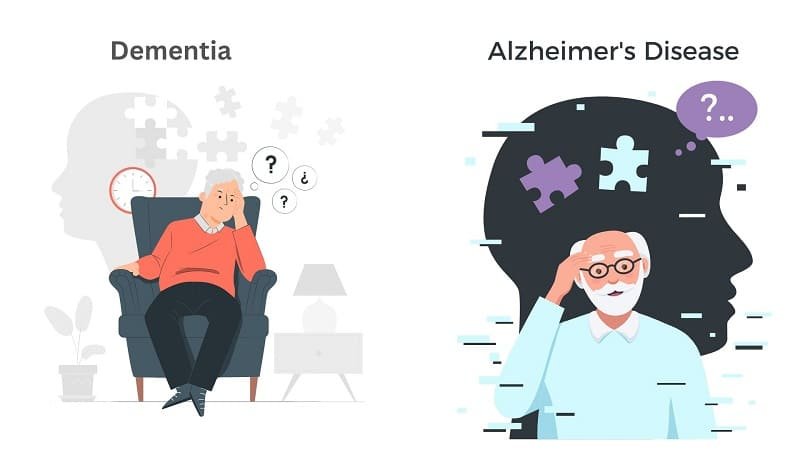Introduction:
Alzheimer’s disease is a progressive neurodegenerative disorder that primarily affects memory, cognitive function, and daily activities. As the disease advances, individuals and their families face the daunting challenges associated with the final stages of Alzheimer’s. In this comprehensive guide, we will delve into the symptoms of the final stages of Alzheimer’s, offering insights into what to expect and how to provide optimal care.
Understanding the Final Stages:
Profound Memory Loss: In the final stages of Alzheimer’s, memory loss becomes more profound, making it increasingly difficult for individuals to recognize even close family members. Moments of clarity become fleeting, leaving loved ones grappling with the heartbreaking reality of the disease’s toll.
Severe Cognitive Decline: Cognitive functions continue to decline significantly, impacting the ability to communicate and perform routine tasks. Simple activities such as eating, dressing, and bathing become increasingly challenging, necessitating heightened support and assistance.
Language and Communication Difficulties: Language skills deteriorate, and communication becomes limited. Individuals may struggle to articulate thoughts, leading to increased frustration and isolation. Loved ones and caregivers need to adapt their communication styles to provide the necessary support and understanding.
Motor Skills Impairment: The final stages of Alzheimer’s often bring about a decline in motor skills. Walking, coordination, and overall physical mobility become compromised, increasing the risk of falls and injuries. Adaptive equipment and a safe living environment become crucial at this stage.
Behavioral Changes: Behavioral changes, including aggression, agitation, and wandering, may intensify during the final stages of Alzheimer’s. Understanding and managing these behaviors require patience, empathy, and specialized care strategies.
Weight Loss and Nutrition Challenges: Individuals in the advanced stages may experience weight loss due to difficulties swallowing, decreased appetite, or challenges with feeding. Ensuring proper nutrition becomes a key focus for caregivers to maintain overall health and well-being.
Inability to Perform Basic Functions: As Alzheimer’s progresses, individuals may lose the ability to perform basic functions independently. This includes personal hygiene, using the restroom, and other essential activities of daily living. Caregivers play a crucial role in assisting with these tasks with compassion and dignity.
Conclusion:
In the final stages of Alzheimer’s, understanding and addressing the evolving symptoms is essential for providing compassionate care. While each individual’s journey with Alzheimer’s is unique, recognizing the common symptoms of the final stages empowers caregivers to tailor their approach and support their loved ones effectively.
Navigating this challenging phase requires a multidisciplinary approach, involving healthcare professionals, support groups, and a personalized care plan. By staying informed about the symptoms of the final stages of Alzheimer’s, families can enhance the quality of life for their loved ones and foster an environment of love and understanding during this difficult time.
Faq Relating to " What are the Symptoms of the final Stages of Alzheimer’s "
In the final stages of Alzheimer’s, key symptoms include profound memory loss, severe cognitive decline, language and communication difficulties, impaired motor skills, behavioral changes, weight loss, and an inability to perform basic functions.
Adapting communication involves using simple, clear language, maintaining a calm demeanor, and relying on non-verbal cues. Patience, empathy, and active listening are essential when interacting with someone in the advanced stages of Alzheimer’s.
Behavioral changes can include aggression, agitation, and wandering. Managing these changes involves understanding triggers, creating a structured routine, and seeking support from healthcare professionals. In some cases, medications may be considered.
Depending on the specific needs, adaptive equipment may include walkers, grab bars, and specialized utensils. Creating a safe living environment is crucial to prevent falls and injuries.
Maintaining dignity involves respecting the individual’s preferences, providing personal care with sensitivity, and involving them in decision-making to the extent possible. Creating a supportive and compassionate environment is essential.
A comprehensive care plan involves collaboration with healthcare professionals to address medical, emotional, and practical needs. This may include palliative care, access to support groups, and guidance on end-of-life decisions.
Numerous resources, including Alzheimer’s associations, support groups, and online forums, offer guidance and emotional support. Healthcare professionals can provide information on local services, respite care, and specialized programs.
Enhancing quality of life involves focusing on meaningful activities, creating a familiar and comforting environment, and ensuring the individual is surrounded by love and understanding. Regular communication with healthcare providers is vital to address evolving needs.
While experimental treatments and clinical trials are ongoing, they typically focus on earlier stages of the disease. It’s essential to consult with healthcare professionals to explore available options and determine the most appropriate course of care for individuals in the final stages.











